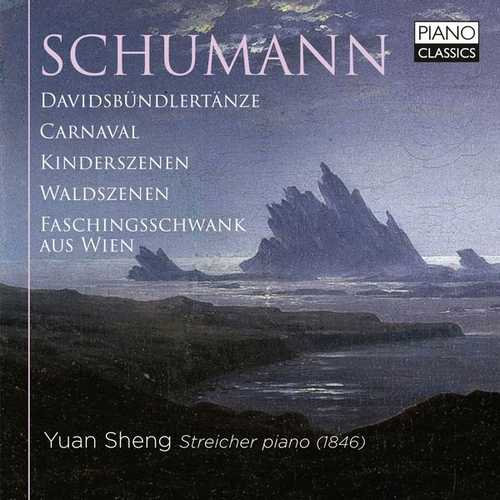

Composer: Robert Schumann
Performer: Yuan Sheng
Format: FLAC (tracks)
Label: Piano Classics
Catalogue: PCL10195
Release: 2021
Size: 482 MB
Recovery: +3%
Scan: yes
Davidsbündlertänze, Op. 6
01. I. Lebhaft
02. II. Innig
03. III. Mit Humor
04. IV. Ungeduldig
05. V. Einfach
06. VI. Sehr Rasch
07. VII. Nicht Schnell
08. VIII. Frisch
09. IX. Lebhaft
10. X. Balladenmäßig – Sehr Rasch
11. XI. Einfach
12. XII. Mit Humor
13. XIII. Wild Und Lustig
14. XIV. Zart Und Singend
15. XV. Frisch
16. XVI. Mit Gutem Humor
17. XVII. Wie Aus Der Ferne
18. XVIII. Nicht Schnell
Carnaval, Op. 9
19. I. Préambule
20. II. Pierrot
21. III. Arlequin
22. IV. Valse Noble
23. V. Eusebius
24. VI. Florestan
25. VII. Coquette
26. VIII. Réplique
27. IX. Papillons
28. X. Lettres Dansantes
29. XI. Chiarina
30. XII. Chopin
31. XIII. Estrella
32. XIV. Reconnaissance
33. XV. Pantalon Et Colombine
34. XVI. Valse Allemande
35. XVII. Paganini
36. XVIII. Aveu
37. XIX. Promenade
38. XX. Pause
39. XXI. Marche Des Davidsbündler Contre Les Philistins
Kinderszenen, Op. 15
40. I. Von Fremden Ländern Und Menschen
41. II. Kuriose Geschichte
42. III. Hasche-Mann
43. IV. Bittendes Kind
44. V. Glückes Genug
45. VI. Wichtige Begebenheit
46. VII. Träumerei
47. VIII. Am Kamin
48. IX. Ritter Vom Steckenpferd
49. X. Fast Zu Ernst
50. XI. Fürchtenmachen
51. XII. Kind Im Einschlummern
52. XIII. Der Dichter Spricht
Faschingsschwank Aus Wien, Op. 26
53. I. Allegro
54. II. Romanze
55. III. Scherzino
56. IV. Intermezzo
57. V. Finale
Waldszenen, Op. 82
58. I. Eintritt
59. II. Jäger Auf Der Lauer
60. III. Einsame Blumen
61. IV. Verrufene Stelle
62. V. Verrufene Stelle
63. VI. Herberge
64. VII. Vogel Als Prophet
65. VIII. Jagdlied
66. IX. Abschied
Five major piano cycles of early Romanticism, newly recorded by a major exponent of historically informed keyboard playing. Acclaimed as China’s “premier interpreter of Bach” by International Piano Magazine, the Chinese pianist Yuan Sheng has gained international recognition through his performances in the United States and China. The New York Times praised Sheng’s performances of Bach as “models of clarity, balance and proportion”. His discography includes several of the composer’s major cycles such as the Goldberg Variations and Partitas.
This depth of study and beauty of sound, informed by intensive study with Rosalyn Tureck, also mark out his newly recorded interpretations of five major piano cycles by Robert Schumann, who along with Chopin did more than any other composer to expand the horizons of the piano in the early decades of the 19th century and position it as the supreme articulation of a Romantic composer’s ambition in the hands of a single performer. Thus the present album makes an essential complement to Yuan Sheng’s extensive collection of Chopin’s work.
While Sheng’s Chopin was recorded on an 1845, he touched here on a Streicher fortepiano from 1846. From the Davidsbündlertänze of 1837 through to the Waldszenen of 1849, the collection surveys the peaks of Schumann’s piano writing with a concentration on the composer’s gift for distilling a mood within a miniature. This mood-painting reaches its height in the seventh movement of Waldszenen which became an avatar of Romanticism, Der Vogel als Prophet, connecting worlds as seemingly distant as Rameau and Messiaen.
The piano cycles presented here offer a wide variety of emotions, from the sublime calm of a summer evening, the intimacy of a dream, the soaring of young passion to the sinister atmosphere of a pitch-dark night. In Carnaval, Op. 9 and Davidsbündlertänze, Op. 6 Schumann presents characters from the Commedia dell’arte, each representing different characteristics and emotions. In the characters of Florestan and Eusebius Schumann finds his own innermost personae: the dreamlike Eusebius contra the passionate Florestan. The Kinderszenen is unique in the evocation of childhood and its contrasting emotions, the Waldszenen evoke nature’s realm, its natural, animal and human (the hunter..) inhabitants.